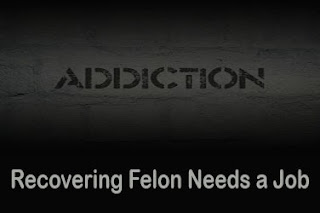By Dr. Michael Pittaro, Faculty Member, Criminal Justice at American Military University
Every week, more than 10,000 prisoners are released from America’s state and federal prisons, equating to more than 650,000 ex-prisoners annually reintegrating into society, according to the U.S. Department of Justice. However, recidivism rates are extremely high with approximately two-thirds of ex-prisoners being rearrested within three years of release, according to the Recidivism Center. It’s estimated that nine million offenders return to prison annually.
It’s clear that there’s not enough support to help ex-prisoners stay out of the correctional system. This is just one element sustaining the disproportionate incarceration of African American males. The likelihood of an African American male being sentenced to prison in his lifetime is one in three, whereas for a Caucasian male it is one in 17, according to The Huffington Post. Similarly, African American females are being sentenced to prison at a far greater rate than Caucasian females.
The criminal justice system needs more resources to improve reintegration efforts and help ex-offenders find adequate jobs and housing so they’re less likely to re-offend. Helping ex-prisoners successfully reintegrate into society will not only reduce costly recidivism rates, but, in many cases, will help break the intergenerational cycle of criminality.
Improving Housing Options for Ex-Prisoners
Most ex-prisoners will return to the same communities they lived and socialized in before their arrest. In many cases, these are neighborhoods that have high rates of poverty and crime, leaving many residents feeling disenfranchised from society with little access to social support programs.
In a prior publication, “Prisoner Reintegration Challenges of Assimilation and Crime Desistance,” I concluded that most ex-prisoners returning to these communities will face uncertainty over their future and animosity from a predominantly unforgiving society, as well as a multitude of personal, social, and legal barriers that prevent them from leading law-abiding lives.
Finding safe and affordable housing is difficult for ex-prisoners who often face limitations on where they can live. Many times, low-income public housing is their only choice. These housing developments are often overrun with drugs, gang violence, and other criminogenic factors. Private housing is often not an option because ex-prisoners are exclusively barred from the private housing market due to the stigma of being an ex-felon.
In some cases, even the public housing market has banned ex-prisoners from renting or leasing an apartment, which can happen if the criminal conviction was drug-related, a sexual offense, or a crime of violence as outlined in the exclusionary policies of the U.S. Department of Housing and Urban Development. If ex-prisoners are forced to return to the same destructive environment that contributed to their initial incarceration, they will often submit to the same temptations and reoffend.
Barriers to Employment for Ex-Prisoners
Along with obtaining suitable housing, finding and maintaining employment can greatly improve an ex-prisoner’s odds of leading a crime-free, productive life. However, ex-prisoners face the society-wide stigma of being an ex-convict, which severely limits the number of sustainable job opportunities available to them.
Many employers conduct criminal history checks on prospective employees and reject anyone with a criminal history. In a somewhat dated, yet significant Urban Institute study from 2003, more than 90 percent of employers surveyed were willing to consider filling job vacancies with welfare recipients, while only about 40 percent were willing to consider hiring an ex-prisoner.
Companies in the retail and service sector that require contact with customers are among the most unlikely to consider hiring a convict. Employer reluctance is greatest when the offense in question was a violent one and least when it was a nonviolent drug offense.
Many ex-prisoners are limited to working inconsistent, low-wage jobs – such as in construction or manufacturing – that make it incredibly difficult to support themselves and their families. In addition, ex-prisoners are often mandated to pay further penalties including parole supervision fees, court costs, restitution, child support, drug-testing fees, counseling fees, and more.
To complicate matters further, finding employment opportunities can be especially challenging because many offenders have limited work histories. According to the Bureau of Justice Statistics, more than one third of all prisoners were unemployed at the time of arrest.
Educational Obstacles to Finding Employment
The National Reentry Resource Center concluded that only about half of incarcerated adults have a high school degree or its equivalent, compared with 85 percent of the adult population. In Prisoner Reintegration Challenges of Assimilation and Crime Desistance, I noted that most ex-prisoners do not have viable, marketable job skills, or sufficient literacy to obtain gainful employment.
To compound matters, many prisoners have a learning disability. According to Joan Petersilia, 11 percent of prisoners have a documented learning disability compared with only 3 percent of the general adult population.
While there are some educational opportunities available to inmates while they are imprisoned, only one third of all prisoners choose to participate. Educational programming, including specific classes that focus on GED preparation, adult basic education, and learning English as a second language, would collectively improve odds of employment.
There’s no doubt that more must be done to help break down the barriers that hinder ex-prisoners from leading law-abiding and productive lives. Helping them find adequate housing and providing educational opportunities that leads to gainful employment are all critical to successful reintegration and reductions in recidivism. However, ultimate change must come from the offender. The ex-prisoner can break the cycle of criminality only by changing his or her unlawful ways. Ex-prisoners must abstain from crime, substance abuse, and other problematic areas which put themselves at risk. They must also seek out opportunities to improve their situation and put in the work and effort to lead productive and lawful lives.
About the Author: Dr. Michael Pittaro is an Assistant Professor of Criminal Justice with American Military University and an Adjunct Professor at East Stroudsburg University. Dr. Pittaro is a criminal justice veteran, highly experienced in working with criminal offenders in a variety of institutional and non-institutional settings. Before pursuing a career in higher education, Dr. Pittaro worked in corrections administration; has served as the Executive Director of an outpatient drug and alcohol facility and as Executive Director of a drug and alcohol prevention agency. Dr. Pittaro has been teaching at the university level (online and on-campus) for the past 15 years while also serving internationally as an author, editor, presenter, and subject matter expert. Dr. Pittaro holds a BS in Criminal Justice; an MPA in Public Administration; and a PhD in criminal justice. To contact the author, please email IPSauthor@apus.edu. For more articles featuring insight from industry experts, subscribe to In Public Safety’s bi-monthly newsletter.
Jobs for Felons: Five Places Felons Can Find Jobs - Get a Job Quickly!
companies hire felons | companies that hire felons | Companies that hire ex-offenders | Employers that hire ex-offenders | employers that hire felons | Jobs for felons | jobs for ex-offenders | jobs that hire felons | places that hire felons | felon friendly jobs | felon friendly employers | how to get a job with criminal record | second chance jobs for felons | recidivism | Re-entry
Jobs for Felons: Why Ex-Prisoners Struggle to Successfully Reintegrate into Society
Eric Mayo
























